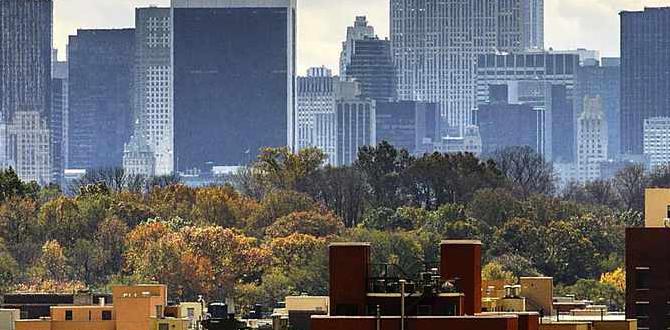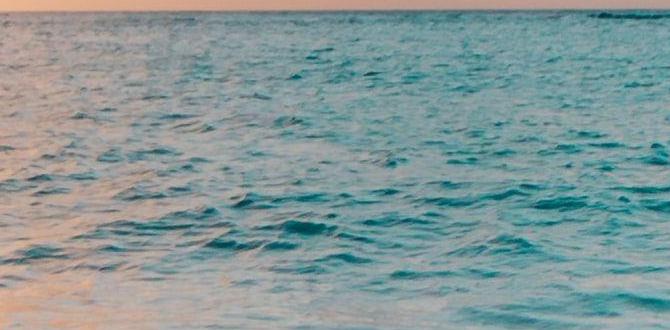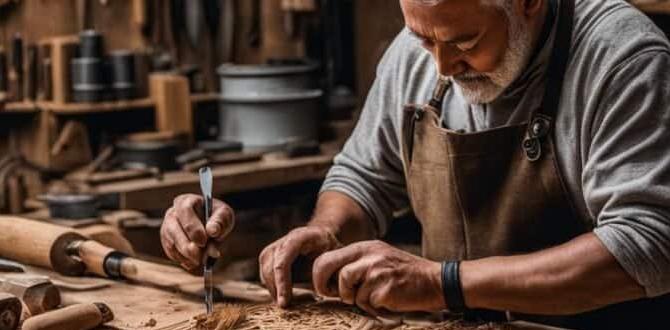Accra in 4 days is easily manageable with this essential, beginner-friendly guide, focusing on key sights and experiences for a short, impactful trip. Discover Ghana’s vibrant capital with a stress-free plan.
Planning a trip to a new city can feel overwhelming, especially when you only have a few days. Accra, Ghana’s bustling capital, offers a rich tapestry of history, culture, and vibrant street life. But how do you fit the best of it into just four days without feeling rushed? Don’t worry!
At Journey Essentials, we believe travel should be comfortable and exciting, not stressful. This guide is designed to help you navigate Accra with ease, ensuring you experience its highlights without missing a beat. We’ll break down each day into manageable activities, focusing on convenience and enjoyment. Get ready to discover the heart of Ghana!
Accra 4-Day Itinerary: Your Essential Quick Guide
Welcome to Accra! This dynamic city, perched on the Atlantic coast, is a gateway to Ghana’s rich history and vibrant present. Whether you’re a solo explorer, a family on an adventure, or seeking cultural immersion, a four-day trip allows for a fantastic introduction.
We’ve crafted this itinerary to be beginner-friendly, blending iconic landmarks with local flavor. This guide is designed to maximize your enjoyment and minimize your planning stress, leaving you free to soak in the Ghanaian spirit. Let’s dive into your whirlwind Accra adventure!
Day 1: Arrival and Historical Immersion
Your first day in Accra is all about settling in and stepping back in time. We’ll focus on understanding the city’s past and getting a feel for its atmosphere. This will set a great foundation for the rest of your trip.
Morning: Arrival and Check-in
Upon arrival at Kotoka International Airport (ACC), you’ll likely feel the warm Ghanaian air. If you’ve pre-booked an airport transfer or have a taxi arranged, head straight to your accommodation. If not, be sure to use official airport taxis to ensure safety and fair pricing. For a stress-free start, consider hotels in areas like Osu, Cantonments, or Airport Residential Area, which offer good accessibility.
- Tip: Have some Ghanaian Cedis (GHS) ready for immediate expenses like transport or snacks. Currency exchange is available at the airport, or you can use ATMs.
Late Morning: Independence Square and Kwame Nkrumah Mausoleum
Start your historical journey at the Independence Square (also known as Black Star Square). This vast public space commemorates Ghana’s independence from British rule in 1957. It’s an iconic landmark, often used for national celebrations. Imagine the crowds gathered here watching the dawn of a new nation!
Next, visit the Kwame Nkrumah Mausoleum and Memorial Park. This is a poignant tribute to Ghana’s first president, Dr. Kwame Nkrumah, a pivotal figure in African independence movements. The museum inside details his life and legacy. It’s an important stop for understanding Ghana’s modern history.
- Practical Tip: Wear comfortable walking shoes and carry water, especially if visiting during the hotter parts of the day.
Afternoon: Jamestown Exploration
Dive into the heart of old Accra with a visit to Jamestown. This historic fishing community is alive with vibrant street art, colonial architecture, and the daily hustle of fishermen. Wander through its narrow streets, observe local life, and visit the Jamestown Lighthouse for panoramic views. You’ll find a raw, authentic side of Accra here – a photographer’s paradise!
- Neighborhood Vibe: Jamestown offers a stark contrast to modern Accra, showcasing its colonial past and enduring traditions.
Evening: Osu Night Market and Dinner
As evening approaches, head to Osu for dinner. The Osu Oxford Street area is a hub for restaurants offering both Ghanaian delicacies and international cuisine. For a truly local experience, explore the Osu Night Market if available, or try a restaurant serving hearty dishes like Fufu, Jollof Rice, or Banku with grilled tilapia. It’s a chance to taste the authentic flavors of Ghana!
- Food Recommendation: Don’t miss trying Ghanaian Jollof Rice – a staple that sparks friendly debate across West Africa!
Day 2: Culture, Art, and Crafts
Day two is dedicated to immersing yourself in Ghana’s rich artistic heritage and cultural expressions. We’ll explore museums, art centers, and perhaps pick up some unique souvenirs.
Morning: National Museum of Ghana
Begin your day at the National Museum of Ghana. Though it has undergone renovations, it’s a crucial place to understand Ghana’s history, archaeology, and ethnography. It houses an impressive collection of artifacts, traditional crafts, and exhibits that tell the story of Ghana from ancient times to the present. It’s essential for gaining context about the country you’re exploring.
- External Link: For an insight into Ghana’s cultural wealth, you can explore resources from the UNESCO database on intangible cultural heritage in Ghana.
Late Morning: Artists Alliance Gallery
Next, visit the Artists Alliance Gallery. This stunning three-story building showcases a vast collection of contemporary and traditional Ghanaian art. You’ll find everything from paintings and sculptures to intricate carvings. It’s a fantastic place to appreciate the talent of Ghanaian artists and perhaps find a unique piece to take home. The architecture itself is also a marvel, offering great views from its upper levels.
- Art Lover’s Gem: Prepare to be amazed by the diverse and vibrant artwork on display.
Afternoon: Arts Centre and Makola Market
Immerse yourself in the bustling atmosphere of the Arts Centre. This is your go-to spot for authentic Ghanaian crafts, souvenirs, and art. You’ll find wood carvings, beadwork, kente cloth, leather goods, and more. Remember to haggle respectfully – it’s part of the shopping experience!
For a truly local market experience, brave the vibrant chaos of Makola Market. It’s a sensory explosion of sights, sounds, and smells, offering everything from fresh produce and spices to textiles and household goods. It’s a fantastic place to observe daily life and practice your bargaining skills (though it can be intense for beginners).
- Souvenir Shopping: Kente cloth, Adinkra symbols, and carved wooden items are popular choices.
Evening: Ghanaian Cuisine Cooking Class (Optional) or Local Restaurant
For an interactive cultural experience, consider booking a Ghanaian cooking class. You’ll learn to prepare traditional dishes and enjoy the fruits of your labor. If a class isn’t feasible, explore more local eateries. Try a spot serving a variety of fufu preparations (with groundnut soup, light soup, or palm nut soup) or a hearty stew with rice. Experiencing the food is a key part of understanding any culture.
- Culinary Adventure: Embrace new tastes and textures – Ghanaian food is known for its rich flavors.
Day 3: Nature, Wildlife, and Coastal Breezes
Today, we venture slightly outside the immediate city center to explore Ghana’s natural beauty and some fascinating wildlife.
Morning: Kakum National Park Day Trip
Embark on a trip to Kakum National Park. This stunning rainforest reserve is famous for its Canopy Walkway – a series of bridges suspended high among the treetops. Walking across this walkway offers a unique perspective of the forest ecosystem and incredible views. It’s an exhilarating experience and a chance to connect with nature.
- Height Considerations: The Canopy Walkway involves heights. If you have a strong fear of heights, this might be challenging.
- Getting There: Kakum is about a 3-4 hour drive from Accra. Hiring a driver or joining a guided tour is the most convenient way to visit. This usually involves an early start.
Lunch: Picnic or Local Eatery near Kakum
Enjoy lunch either by packing a picnic to savor amidst the natural beauty near the park, or find a local eatery on your way back towards Accra. Many tours include a stop for lunch. Keep it simple and refreshing after your park adventure.
Afternoon: Tetteh Quarshie Cocoa Farm (Optional stop)
On your way back to Accra, consider a stop at the Tetteh Quarshie Cocoa Farm. This is where cocoa farming was first introduced to Ghana. While it’s a working farm, it offers insight into the origins of one of Ghana’s most important exports. You can learn about the cocoa cultivation process and, of course, enjoy some delicious Ghanaian chocolate!
- Ghanaian Chocolate: Ghana is one of the world’s largest cocoa producers.
Evening: Relaxed Dinner in Accra
After a day of exploration, enjoy a more relaxed evening. Perhaps revisit a favorite neighborhood, try a restaurant with live highlife music if available, or simply dine near your hotel. Consider dishes like Waakye (rice and beans) or Fante Kenkey. This is your chance to unwind and reflect on your day’s adventures.
Day 4: Coastal Views and Departure Preparations
Your final day in Accra blends a bit more relaxed sightseeing with essential preparations for your departure.
Morning: Labadi Beach or Teshie Nungua Beach
Start your last day with some refreshing sea air. Head to Labadi Beach for a relaxed atmosphere, beachside bars, and perhaps some horseback riding. Alternatively, for a more local and vibrant experience, consider Teshie Nungua Beach, known for its animated fishermen and lively atmosphere. It’s a great place for people-watching and enjoying the ocean breeze.
- Beach Etiquette: While beach attire is common, it’s respectful to dress modestly when not directly on the sand, especially when interacting with local communities.
Late Morning: The W.E.B. Du Bois Centre
Before heading to the airport or preparing for your departure, visit the W.E.B. Du Bois Centre. This centre is dedicated to the life and work of the prominent African-American scholar and civil rights activist who became a Ghanaian citizen. It houses his former residence and offers insights into his final years and his impact on Pan-Africanism.
- Historical Significance: A key location for understanding the intellectual ties between Ghana and the African diaspora.
Afternoon: Last-Minute Souvenirs and Lunch
Use your remaining time for any last-minute souvenir shopping or to revisit a place you particularly enjoyed. Enjoy a final Ghanaian lunch. If flying out later, a relaxed meal in a comfortable restaurant would be ideal. Consider one last taste of your favorite Ghanaian dish.
- Packing Tip: If you plan to buy souvenirs like textiles or carvings, ensure they are packed securely to survive the journey home.
Evening: Departure
Head to Kotoka International Airport (ACC) for your departure. Allow ample time for check-in, security, and any last-minute formalities. Reflect on your amazing four days exploring the vibrant heart of Ghana!
Accra 4-Day Itinerary: Essential Quick Guide – Tables
To help you visualize your trip, here is a breakdown of the itinerary and some practical considerations.
Itinerary at a Glance
| Day | Morning | Afternoon | Evening |
|---|---|---|---|
| 1 | Arrival, Independence Square, Kwame Nkrumah Mausoleum | Jamestown Exploration | Osu Night Market & Dinner |
| 2 | National Museum, Artists Alliance Gallery | Arts Centre, Makola Market | Cooking Class or Local Dinner |
| 3 | Kakum National Park (Canopy Walkway) | Lunch, Tetteh Quarshie Cocoa Farm (optional) | Relaxed Dinner in Accra |
| 4 | Labadi Beach or Teshie Nungua Beach | W.E.B. Du Bois Centre, Last-Minute Shopping | Departure |
Essential Practical Information
| Category | Details | Tips for Comfort & Ease |
|---|---|---|
| Visa & Entry | Check visa requirements for your nationality well in advance. Many nationalities require a visa. | Apply early to avoid last-minute stress. Have all documents ready. |
| Currency | Ghanaian Cedi (GHS). ATMs are widely available, and credit cards are accepted in larger hotels and shops. | Carry some cash for local markets and smaller vendors. Inform your bank of your travel dates. |
| Temperatures & Climate | Accra is warm and humid year-round, with average temperatures around 28-30°C (82-86°F). | Pack light, breathable clothing (cotton, linen). Stay hydrated. Consider bringing travel-sized essentials, including personal care items like adult or child diapers if needed for long travel days or unexpected delays, ensuring comfort and confidence. |
| Health & Safety | Consult your doctor about recommended vaccinations (e.g., Yellow Fever) and malaria precautions. | Be cautious with street food initially. Drink bottled water. Keep valuables secure and be aware of your surroundings. |
| Transportation | Taxis, ride-sharing apps (Uber, Bolt), and tro-tros (local minibuses) are common. | Negotiate taxi fares before you start your journey or ensure the meter is used. Tro-tros are very affordable but can be crowded. |
Conclusion
Accra is a city that awakens the senses and leaves a lasting impression. This 4-day itinerary offers a balanced blend of its historical depth, cultural vibrancy, natural beauty, and the warmth of its people. From the echoes of the independence struggle at Kwame Nkrumah Mausoleum to the creative pulse in Jamestown, and the tranquil escape of Kakum
Frequently Asked Questions
What is the best way to get around Accra?
For convenience and comfort, ride-sharing apps like Uber and Bolt are excellent options and often more affordable than traditional taxis. For a more local experience (and a true adventure!), you can use “tro-tros,” the local minibuses, though they can be crowded and follow specific routes. Negotiating fares with regular taxis before your trip is crucial if you opt for them.
Is it safe to travel to Accra?
Accra is generally considered one of the safest capitals in West Africa. However, like any large city, petty crime can occur. It’s advisable to be aware of your surroundings, avoid displaying excessive wealth, and stick to well-lit, populated areas, especially at night. Using reputable transportation and exercising common sense will greatly enhance your safety.
What should I pack for a 4-day trip to Accra?
Pack light, breathable clothing such as cotton or linen. Include a light jacket for cooler evenings, comfortable walking shoes, insect repellent, sunscreen, a hat, and any personal medications. Don’t forget swimwear if you plan to visit beaches. For added convenience and peace of mind, especially if you have specific personal care needs or are traveling with children, consider packing travel-sized essentials like adult or child diapers. These can be incredibly helpful for long travel days or unexpected situations, ensuring continued comfort and dignity.
What are the must-try Ghanaian dishes?
Ghanaian cuisine is delicious and hearty! Must-tries include Jollof Rice (a flavorful rice dish cooked in tomato sauce), Fufu (a pounded dough made from cassava and plantain, served with soup), Banku with Grilled Tilapia (fermented corn dough served with fish), and Waakye (rice and beans cooked together). Don’t forget to try Ghanaian street snacks and, of course, some local chocolate!
Do I need any vaccinations for Ghana?
A Yellow Fever vaccination is typically required for entry into Ghana. It is highly recommended to consult your doctor or a travel clinic at least 4-6 weeks before your trip regarding other recommended vaccinations, such as Hepatitis A, Typhoid, and malaria prophylaxis, depending on your health status and travel plans within Ghana.
What is the best time of year to visit Accra?
Accra has two rainy seasons. The main rainy season is from April to June, and a lighter one occurs from September to October. The period from November to March is generally dry and less humid, making it a popular time to visit. However, Accra is a vibrant destination year-round.
Can I drink the tap water in Accra?
No, it is strongly advised not to drink tap water in Accra. Always drink bottled water or water that has been purified. Ice in drinks should also be avoided unless you are sure it was made from purified water. This caution extends to brushing your teeth; using bottled water is safest.





